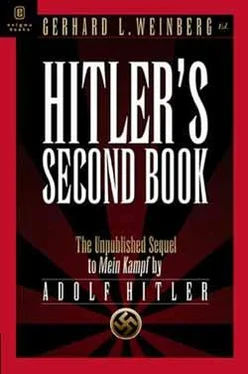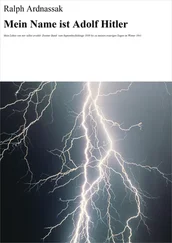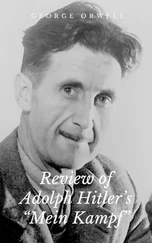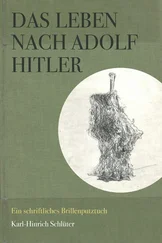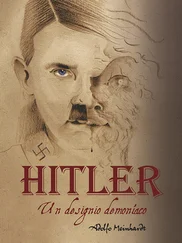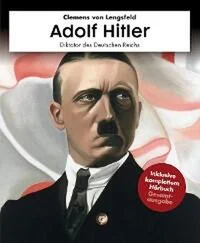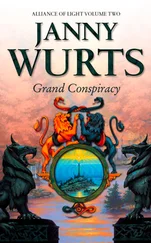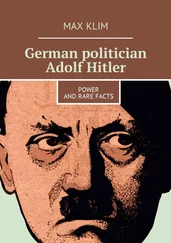Thus a policy which is fundamentally peaceful will be precisely as harmful and devastating in its effects as a policy which knows war as its only weapon.
Politics must fight about the life of a Folk, and for this life; moreover, it must always choose the weapons of its struggles so that life in the highest sense of the word is served. For one does not make politics in order to be able to die, rather one may only at times call upon men to die so that a nation can live. The aim is the preservation of life and not heroic death, or even cowardly resignation.
Chapter 2
THE NECESSITY OF STRIFE
A Folk’s struggle for existence is first and foremost determined by the following fact:
Regardless of how high the cultural importance of a Folk may be, the struggle for daily bread stands at the forefront of all vital necessities. To be sure, brilliant leaders can hold great goals before a Folk’s eyes, so that it can be further diverted from material things in order to serve higher spiritual ideals. In general, the merely material interest will rise in exact proportion as ideal spiritual outlooks are in the process of disappearing. The more primitive the spiritual life of man, the more animallike he becomes, until finally he regards food intake as the one and only aim of life. Hence a Folk can quite well endure a certain limitation of material goals, as long as it is given compensation in the form of active ideals. But if these ideals are not to result in the ruin of a Folk, they should never exist unilaterally at the expense of material nourishment, so that the health of the nation seems to be threatened by them. For a starved Folk will indeed either collapse in consequence of its physical undernourishment, or perforce bring about a change in its situation. Sooner or later, however, physical collapse brings spiritual collapse in its train. Then all ideals also come to an end. Thus ideals are good and healthy as long as they keep on strengthening a Folk’s inner and general forces, so that in the last analysis they can again be of benefit in waging the struggle for existence. Ideals which do not serve this purpose are evil, though they may appear a thousand times outwardly beautiful, because they remove a Folk more and more from the reality of life.
But the bread which a Folk requires is conditioned by the living space at its disposal. A healthy Folk, at least, will always seek to find the satisfaction of its needs on its own soil. Any other condition is pathological and dangerous, even if it makes possible the sustenance of a Folk for centuries. World trade, world economy, tourist traffic, and so on, and so forth, are all transient means for securing a nation’s sustenance. They are dependent upon factors which are partly beyond calculation, and which, on the other hand, lie beyond a nation’s power. At all times the surest foundation for the existence of a Folk has been its own soil.
But now we must consider the following:
The number of a Folk is a variable factor. It will always rise in a healthy Folk. Indeed, such an increase alone makes it possible to guarantee a Folk’s future in accordance with human calculations. As a result, however, the demand for commodities also grows constantly. In most cases the so called domestic increase in production can satisfy only the rising demands of mankind, but in no way the increasing population. This applies especially to European nations. In the last few centuries, especially in most recent times, the European Folks have increased their needs to such an extent that the rise in European soil productivity, which is possible from year to year under favourable conditions, can hardly keep pace with the growth of general life needs as such. The increase of population can be balanced only through an increase, that is, an enlargement, of living space. Now the number of a Folk is variable, the soil as such, however, remains constant. This means that the increase of a Folk is a process, so self evident because it is so natural, that it is not regarded as something extraordinary. On the other hand, an increase in territory is conditioned by the general distribution of possessions in the world; an act of special revolution, an extraordinary process, so that the ease with which a population increases stands in sharp contrast to the extraordinary difficulty of territorial changes.
Yet the regulation of the relation between population and territory is of tremendous importance for a nation’s existence. Indeed, we can justly say that the whole life struggle of a Folk, in truth, consists in safeguarding the territory it requires as a general prerequisite for the sustenance of the increasing population. Since the population grows incessantly, and the soil as such remains stationary, tensions perforce must gradually arise which at first find expression in distress, and which for a certain time can be balanced through greater industry, more ingenious production methods, or special austerity. But there comes a day when these tensions can no longer be eliminated by such means. Then the task of the leaders of a nation’s struggle for existence consists in eliminating the unbearable conditions in a fundamental way, that is, in restoring a tolerable relation between population and territory.
In the life of nations there are several ways for correcting the disproportion between population and territory.
The most natural way is to adapt the soil, from time to time, to the increased population. This requires a determination to fight and the risk of bloodshed. But this very bloodshed is also the only one that can be justified to a Folk. Since through it the necessary space is won for the further increase of a Folk, it automatically finds manifold compensation for the humanity staked on the battlefield. Thus the bread of freedom grows from the hardships of war. The sword was the path breaker for the plough. And if we want to talk about human rights at all, then in this single case war has served the highest right of all: it gave a Folk the soil which it wanted to cultivate industriously and honestly for itself, so that its children might some day be provided with their daily bread. For this soil is not allotted to anyone, nor is it presented to anyone as a gift. It is awarded by Providence to people who in their hearts have the courage to take possession of it, the strength to preserve it, and the industry to put it to the plough.
Hence every healthy, vigorous Folk sees nothing sinful in territorial acquisition, but something quite in keeping with nature. The modern pacifist who denies this holy right must first be reproached for the fact that he himself at least is being nourished on the injustices of former times. Furthermore, there is no spot on this Earth that has been determined as the abode of a Folk for all time, since the rule of nature has for tens of thousands of years forced mankind eternally to migrate. Finally the present distribution of possessions on the Earth has not been designed by a higher power, but by man himself. But I can never regard a solution effected by man as an eternal value which Providence now takes under its protection and sanctifies into a law of the future. Thus, just as the Earth’s surface seems to be subject to eternal geological transformations, making organic life perish in an unbroken change of forms in order to discover the new, this limitation of human dwelling places is also exposed to an endless change. However, many nations, at certain times, may have an interest in presenting the existing distribution of the world’s territories as binding forever, for the reason that it corresponds to their interests, just as other nations can see only something generally manmade in such a situation which at the moment is unfavourable to them, and which therefore must be changed with all means of human power. Anyone who would banish this struggle from the Earth forever would perhaps abolish the struggle between men, but he would also eliminate the highest driving power for their development; exactly as if in civil life he would want to eternalise the wealth of certain men, the greatness of certain business enterprises, and for this purpose eliminate the play of free forces, competition. The results would be catastrophic for a nation.
Читать дальше
